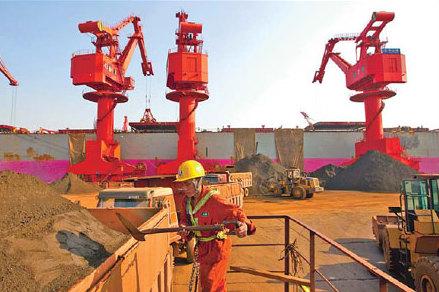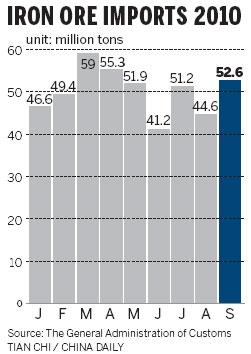
A worker unloads imported iron ore powder at Qingdao port, Shandong province. [China Daily]
China has started talks for next year's iron ore pricing and is expected to increase imports of the raw material in the fourth quarter, the China Iron & Steel Association (CISA) said on Friday.
China initiated discussions with suppliers, Luo Bingsheng, vice-chairman of the industry body, said at a news conference. He did not elaborate.
China will import more iron ore in the fourth quarter compared with any of the previous three quarters because of industry demand for stockpiling, but the whole year's imports will still be lower than last year, he added.
China's import of ore, which is used in smelting steel, was about 150 million tons per quarter in the first three quarters of this year. It reached 628 million tons for the whole of last year.
Imports of iron ore decreased 2.5 percent year-on-year in the first three quarters, according to statistics from the General Administration of Customs. However, China is paying more money this year, spending $19.1 billion more so far compared with the same period last year, a rise of 52.5 percent, because prices soared by 56.31 percent year-on-year.

The rising costs have squeezed steelmakers' profit margins. CISA said the major 77 steel mills reported 64 billion yuan in profit for the first nine months this year, up 98 percent, but the profit margin was only 2.84 percent. The number for September dropped to as low as 1.16 percent.
Profit margins in the steel industry are lower than the average level of China's heavy industry as a whole, which is about 5 percent, industrial experts said.
China's steel sector, accounting for almost half of the world's output, has seen slower production during the third quarter as a result of an oversupply in the market and energy efficiency mandates from government.
China's crude steel demand will remain low in the fourth quarter, even with negative growth, and steel production, as a result, will maintain low growth, CISA said.
Weak demand for steel is largely due to a slowdown in the real estate sector, after the government imposed policies to prevent the economy from overheating, and the automotive industry.
Another factor that helped to curb steel production was the restriction on electricity use in September introduced in order to meet the nation's target in energy efficiency, forcing mills to shut down or scale back and causing a 7.1 percent month-on-month decline in crude steel output.
The steel sector has increased its energy efficiency by 3 percent so far this year, Luo of CISA said.
Industry concentration will intensify and mega-mergers in the steel industry will emerge during the 12th Five-Year Plan (2011-2015), said Luo.





